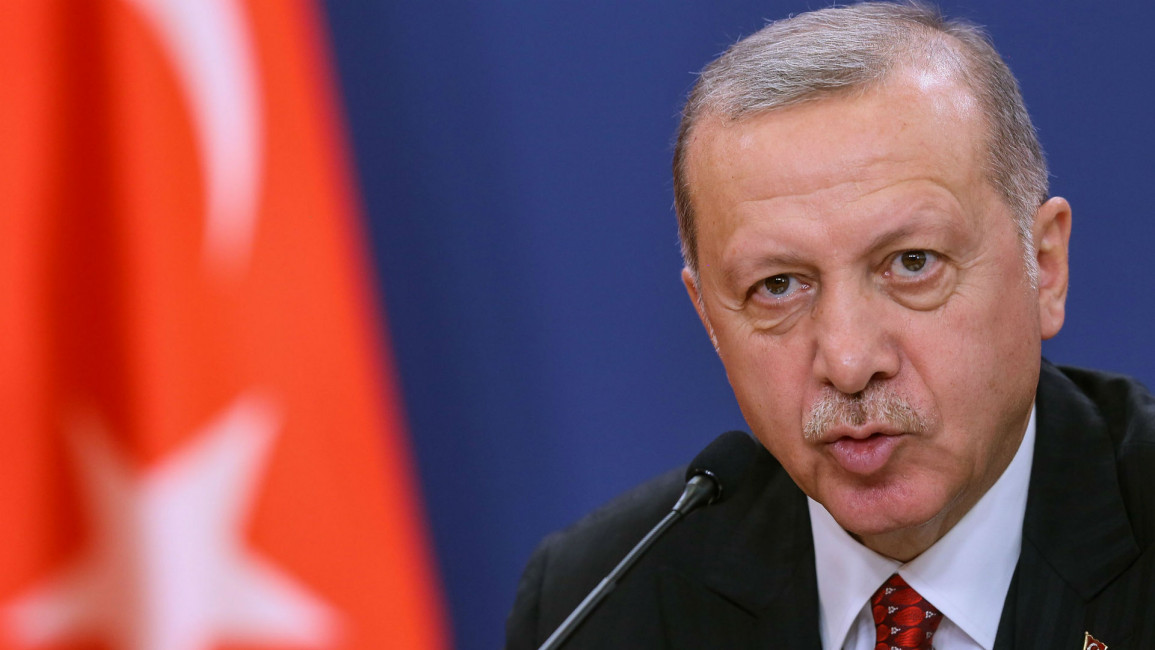Erdogan slams Nobel Prize over 'Bosnia genocide denier' award, then attacks Turkish winner as 'terrorist'
Erdogan's comments came as Handke was set to receive his prize on Tuesday.
Turkey, Bosnia, Croatia, Kosovo and Albania have all refused to send representatives to attend the Nobel ceremony this year over the scandal.
The Swedish Academy's pick for the 2019 prize triggered outrage in Bosnia and beyond. The 77-year-old Austrian author is known as a backer of former Serbian leader Slobodan Milosevic.
Milosevic died in 2006 as he awaited trial on charges of war crimes and genocide in the Hague. Handke, who allegedly received a Yugoslav passport from the strongman, attended Milosevic's funeral, where he reportedly said: "I am here for Yugoslavia, for Serbia, for Slobodan Milosevic."
The decision to award the much-coveted prize to Handke has increased scrutiny on the Academy, which came under fire last year over a rape scandal that drew several resignations.
Gun-Britt Sundstrom resigned from the committee for the Nobel Prize for Literature over the controversy. Peter Englund, former Permanent Secretary of the Swedish Academy, also said he would boycott this year's ceremony.
Handke has denied the 1995 Srebrenica genocide, where more than 8,000 Bosnian Muslims, mostly men and boys, were slaughtered.
The author also compared Serbia's fate to that of the Jews in the Holocaust, although he later apologised and termed the remark a "slip of the tongue". Handke has continued to describe Serbia as a victim in the wars that befell the Balkans following the collapse of Yugoslovia.
"Awarding Nobel Prize in Literature to a racist individual will not mean anything other than awarding human rights violations," the Turkish president said on Tuesday at a ceremony marking the International Day for Human Rights.
|
|
Hundreds of people were also expected to attend a protest against the award in Stockholm.
The prize has also drawn condemnation from journalists who covered the Bosnian war and genocide.
Several of the former war correspondents took to Twitter to share their eyewitness coverage of the atrocities with the hashtag #BosniaWarJournalists.
Christiane Amanpour, Janine di Giovanni and Jeremy Bowen were among the awarded journalists to comment on the controversy.
"I was there. We know who's guilty," CNN journalist Amanpour said in a tweet.
New York Times reporter Roger Cohen added: "Shame on Nobel Committee and Swedish King for handing Nobel literature prize to Peter Handke, who calls the Bosnian genocide myth. It happened."
Peter Maass, editor of The Intercept, concluded: "This will be the Swedish royal family's legacy: they authenticated a genocide denier. The king's sleep tonight should be restless."
Terrorist scandal in Turkey
After condemning the Academy for awarding Handke, Erdogan launched into a tirade accusing the Nobel committee of having given out a prize to a "terrorist from Turkey".
Only two Turkish citizens have been award Nobel prizes. The first went to reknowned author Orhan Pamuk in 2006. In 2015, Turkish-American biochemist Aziz Sancar was awarded the Nobel Prize for Chemistry alongside two other scientists.
The controversial comment quickly fueled speculated on social media, with many asserting that Erdogan had referred to Pamuk as a "terrorist".
|
|
Fahrettin Altun, Erdogan's Communication Director, later backpedalled on the remarks, insisting that the president "absolutely didn't mean him".
"The president referred to others who have been awarded prizes by the Nobel or other international organisations while it has been known to engage in terrorist activity against Turkey," Altun said in a tweet.
He added that Erdogan had criticised the "hypocrisy" of European awards that "reward terrorism and racism".
Turkish Twitter users noted that the president had explicitly referred to the Nobel committee granting prizes to those who "make terror the substance of their novels".
In 2014, an Iraqi member of parliament nominated Abdullah Ocalan, founder of the Kurdistan Workers' Party (PKK), for a Nobel Peace Prize. Amid controversy in Turkey, the Academy refused to confirm whether it had accepted or denied the nomination. Ocalan was not awarded the prize.
The PKK is a Kurdish militia which has been engaged in an on-off insurgency against the Turkish state since the early 1980s.
It is classified as a terrorist organisation in Turkey, where Ocalan has been imprisoned since 1999.
Follow us on Twitter and Instagram to stay connected



